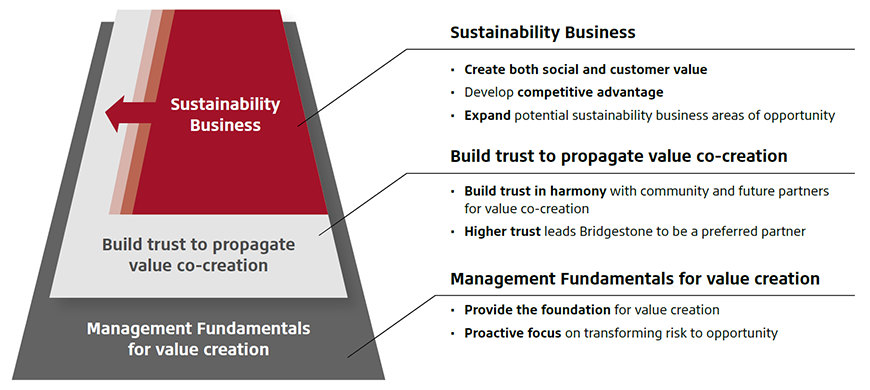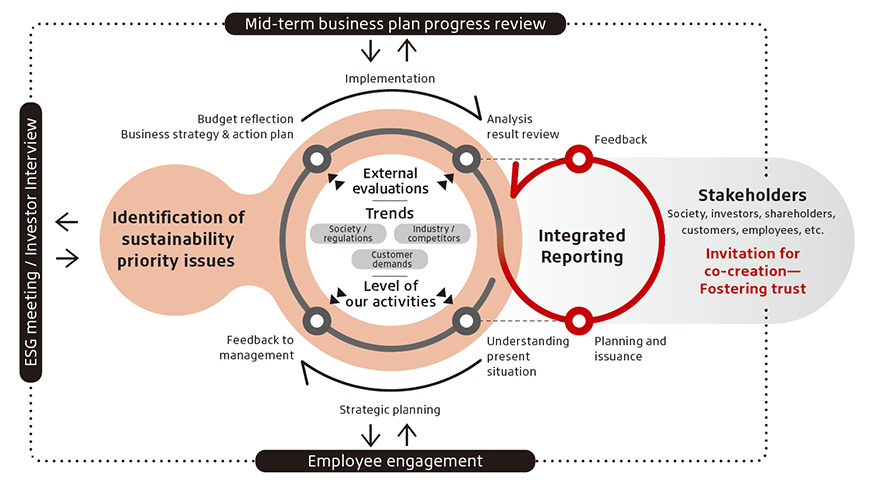Bridgestone is advancing the Mid-Long Term Business Strategy with sustainability at its core to realize its vision of “Toward 2050, Bridgestone continues to provide social value and customer value as a sustainable solutions company.” We believe that it is necessary to anticipate changes in society, turn them into opportunities, and continue to create both social and customer value to contribute to the realization of a sustainable society while also achieving sustainable growth. To this end, we identify priority issues to be addressed.
Sustainability Priority Items
Priority items (sustainability aspects) to continue to create both social and customer value
- Sustainability Framework
- Process for Identifying Sustainability Priorities
- Integrating sustainability across the Bridgestone Group
- Sustainability policies and guidelines
Sustainability Framework
Bridgestone believes that it is essential to build a deeper relationship of trust with our stakeholders while continuing to promote initiatives that form an indispensable foundation for a responsible company to create new value for society and our customers, and to achieve sustainable growth together with our customers and partners. We have categorized and systematized our approach to sustainability into a Sustainability Framework. Based on this framework, we will clarify our priority items and create value for society and our customers through its business, social contribution and co-creation activities with all our partners.

The first layer: Sustainability Business
We believe that we can gain a competitive advantage by linking sustainability and business and creating both social and customer value. We seek to create social and customer value by contributing to the realization of a circular economy and carbon neutrality through its Sustainability Business that includes the tire and rubber, solutions and recycle businesses. The area in the red arrow extending to the left indicates the intention to further expand our business opportunities to develop the competitive advantage based on the Mid-Long Term Business Strategy.
The second layer: Build trust to propagate value co-creation
We believe that co-creation of value with customers and partners is essential to realize our Sustainability Business, and a deeper relationship of trust is important for value co-creation. By fostering trust as a preferred partner for society, partners and customers, we will co-create innovations and values, and create opportunities for the Sustainability Business that provides social and customer value. We believe the depth of our sustainability efforts contributes greatly to fostering trust in us and is actively involved in social contributions and other activities that help foster that trust with local communities.
The third layer: Management Fundamentals for value creation
As a responsible company, Bridgestone is fulfilling its social responsibility by proactively responding to society’s expectations to accelerate its sustainability journey. These efforts go beyond risk avoidance to finding innovative ways to transform risk into growth opportunity to establish Management Fundamentals for value creation. We will strive to create value by enhancing community and stakeholder engagements, respecting business and human rights and diversity, equity and inclusion (DE&I), enhancing talent creativity and strengthening corporate resilience.
Process for Identifying Sustainability Priorities

Through dialogue with a diverse range of stakeholders, including institutional investors, NGOs, and employees, Bridgestone recognizes their expectations and the challenges we face. We promote stakeholder engagement based on integrated reporting, and also closely link it to the process of prioritizing sustainability issues and integrating them into the business strategy while ensuring alignment. As shown in the figure, the two processes are being rotated as two wheels, and continuous improvement of both processes is being pursued.
As part of the process of identifying priority issues, Bridgestone conducted a materiality assessment. Bridgestone collects information through extensive desktop research and interviews with internal and external stakeholders, including investors, customers, partners, NGOs, industry associations and experts. Bridgestone then analyzes risks and opportunities and their impacts, including social expectations and requirements, the level of importance of each issue and the impact of our corporate activities on environment and society to confirm their importance. Based on the assessment, Bridgestone identified the following 26 issues.
Issues to be considered in identifying priority issues
| Environmental | Social | Workforce | Product and solutions | Governance |
|---|---|---|---|---|
|
|
|
|
|
The 26 material issues identified through the process are then reorganized from a business perspective of creating social value and customer value in line with the sustainability framework mentioned earlier. These reorganized issues are reviewed by global management, including the Global CEO, and set as sustainability priorities. These sustainability priorities are shared and reported to the Board of Directors along with updates on the progress of sustainability initiatives, social trends and customer demands, etc.
We regularly review our sustainability priorities through the PDCA cycle, which involves identifying issues, planning, implementing, reviewing and reassessing. We constantly monitor and sense social trends such as laws and regulations, industry and competitor trends, as well as customer expectations and requests, and by analyzing risks, opportunities, and their impact. We also identify and confirm any gaps between the level of our activities and information disclosure and the expectations of society and customers by analyzing the results of major external evaluations. Based on these activities, we hold in-depth discussions with management, incorporate the issues identified into corporate and business strategies and promote them. We report the progress, results of activities, and future issues to management in an ongoing PDCA cycle. Furthermore, we proactively disclose the results of our activities, and feedback from stakeholders, such as their expectations and suggestions for improvement obtained through dialogue based on the integrated report, is shared with management and reflected in the identification of issues and our management strategy. This process is not only for integrated reporting, but also for the entire process of identifying issues and promoting management strategies, including raising the level of our sustainability initiatives. (Opportunities for dialogue with stakeholders include ESG interviews with institutional investors, dialogue with NGOs, customers, etc., and ESG small meetings.)
The following sustainability priorities have been identified for FY2025.
- Establishment and evolution of the Sustainability Business Model: develop readiness toward carbon neutrality, expand circular economy business activities, and promote a nature-positive world (focusing on “initiatives for sustainable use of natural rubber and water resources”)
- Fostering trust with customers, partners and local communities: contribute to solving issues in local communities, and promote road safety education around the world
- Respect for human rights: promote initiatives in line with the Global Human Rights Policy and continue reinforcement of activity levels
- TRWP (tire and road wear particles)/6PPD (an antioxidant and antiozonant commonly used in the tire industry): in collaboration with other industry players and academic institutions, investigate the environmental impacts of tires throughout their lifecycle as an industry leader. Continue to promote initiatives to reduce TRWP across the value chain from “produce and sell” to “use” of tires, including promotion of long-life products and collaboration with the solutions business. Promote initiatives to develop 6PPD alternatives based on the basic premise that it is possible to ensure tire safety and security.
Priority items (sustainability aspect) to continue to create both social and customer value
| Priority items to be addressed | Sub-categories | Targets | Progress (2024) |
Creation of value stated in the Bridgestone E8 Commitment | Contribution to the SDGs |
|---|---|---|---|---|---|
| Establishment and evolution of the Sustainability Business Model | Develop readiness toward carbon neutrality | Reduce CO2 emissions (Scope 1 and 2): Reduce CO2 emissions by 50% by 2030 (compared to 2011) Achieve carbon neutrality by 2050 | Scope 1 and 2: 62% reduction of CO2 emissions (compared to 2011) Ratio of renewable energy (electricity): 75% |
Energy: Committed to the realization of a carbon neutral mobility society Ecology: Committed to advancing sustainable tire technologies and solutions that preserve the environment for future generations |
|
| Contribute to CO2 reduction (Scope 3): Contribute to reducing more than five times our CO2 emissions by 2030 | |||||
| Expand circular economy business activities | Improve resource productivity and develop long life/resource-saving design Contribute to a circular economy: Increase the ratio of recycled and renewable resources to 40% by 2030*1 Use 100% sustainable materials by 2050 |
Ratio of recycled and renewable materials: 39.9% | |||
| Promote nature-positive world | Formulate and implement a water stewardship plan at production sites located in water stress areas: Implement at all targeted sites by 2030 |
Being implemented at all 17 targeted sites | |||
| Reinforce support for natural rubber smallholders: Support for a cumulative total of 12,000 smallholders by 2026*2 | Training and technical support provided to a cumulative total of 11,687 smallholders | ||||
| Enhance community engagements/partnerships | Social contribution | Contribute to solving issues in local communities | <Total> 1,403 initiatives*3 were implemented in 37 countries and regions and reached 329,031 people*4 <Road safety> 91 initiatives*3 related to road safety were implemented in 28 countries and regions, and reached 168,537 people*4 |
Ease: Committed to bringing comfort and peace of mind to mobility life Empowerment: Committed to contributing to a society that ensures accessibility and dignity for all |
|
| Road safety | Promote road safety education around the world | ||||
| Respect for Human rights | Promote initiatives in line with the Global Human Rights Policy (develop and rollout an Implementation Guideline, etc.) | Conducted the following two types of human rights risk assessments across its own operations in 2023: ・Deep-dive human rights issue- and site-specific assessments ・Human Rights Risk Assessment Survey (HRRAS) targeting regional headquarters and subsidiaries across the globe ・Implemented measures in 2024 to address the improvement opportunities identified in the assessments |
Empowerment: Committed to contributing to a society that ensures accessibility and dignity for all | ||
| TRWP (tire and road wear particles)/6PPD (an antioxidant and antiozonant commonly used in the tire industry) | Lead industry initiatives (develop impact assessment studies and evaluation tests, promote initiatives to reduce impacts, etc.) | Actively participated in initiatives in industry organizations, helping to develop globally consistent evaluation test methods with the aim of developing ISO standards |
Ecology: Committed to advancing sustainable tire technologies and solutions that preserve the environment for future generations | ||
- Within total material weight for tire products including tire casing for retreading
- Cumulative total from 2023
- Counting of “initiatives” varies by country or region.
- The number of people who directly benefited from Bridgestone's activities, which varies by country and region and only includes those activities for which the Group has confirmed the status.
Integrating sustainability across the Bridgestone Group
Bridgestone continues to integrate sustainability culturally, strategically and operationally across the organization as part of its Mid-Long Term Business Strategy.
Cultural integration
We incorporate the Bridgestone’s mission, the Corporate Commitment and the Sustainability Framework into our business, values and brand every day to ensure that it becomes an integral part of teammates’ lives, in all that we do.
Strategic integration
With sustainability as its core, Bridgestone is working toward the Mid-Long Term Business Strategy and Mid Term Business Plan, aligned with the Sustainability Framework.
For the details of the Mid-Long Term Business Strategy and the Mid Term Business Plan, see “IR Library.”
Operational integration
The Global Sustainability Committee (GSC) that reports to the Global Executive Committee (Global EXCO), the highest-level committee overseeing our business strategy and execution, is responsible for holistically leading our Sustainability Framework.
For the detail of the management structure, see “Management Structure.”
